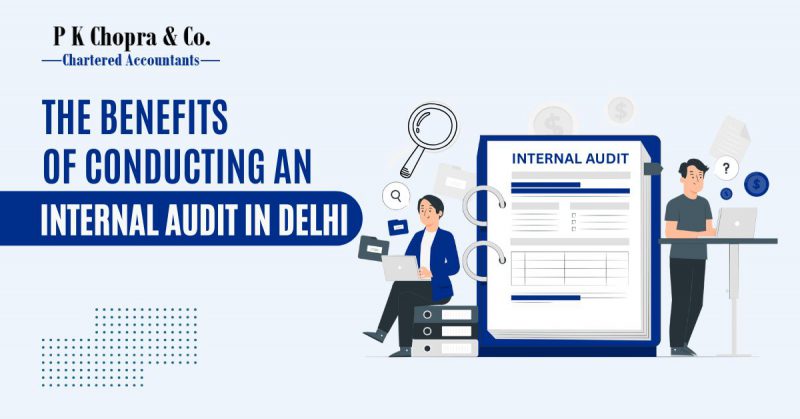The Benefits of Conducting an Internal Audit in Delhi
Every successful organization thrives on transparency, control, and accountability. Internal audits are the backbone of these values. They help businesses evaluate operations, strengthen internal processes, and ensure compliance with regulations. For businesses in Delhi—a city known for its diverse industries and economic growth—conducting regular internal audits is no longer a choice but a necessity.
About PK Chopra & Co.
Established in 1963, PK Chopra & Co. stands as one of India’s most trusted professional services firms. Headquartered in Gurugram, the firm operates through satellite offices in Delhi, Mumbai, Coimbatore, Ahmedabad, Lucknow, Bangalore, and Kochi.
With over four decades of experience, PK Chopra & Co. has been actively serving small, medium, and large enterprises across the world. The firm’s commitment to excellence, ethics, and innovation makes it a preferred partner for businesses seeking reliable internal audit services in Delhi.
Understanding Internal Audit
An internal audit is an independent, objective assurance activity designed to improve an organization’s operations. Unlike external audits—which primarily focus on financial statements—internal audits assess risk management, control processes, and governance within an organization.
It’s not just about ticking boxes; it’s about enhancing efficiency, identifying risks, and fostering a culture of continuous improvement.
Why Internal Audits Are Essential for Businesses in Delhi
Delhi is home to thousands of organizations—ranging from startups to multinational corporations. With growing competition, regulatory scrutiny, and financial complexity, businesses must ensure their systems and processes are robust.
Conducting internal audits helps Delhi-based companies maintain financial discipline, detect compliance gaps, and prevent fraud, ensuring long-term sustainability.
Key Objectives of an Internal Audit
1. Strengthening Internal Controls
Internal audits help organizations identify weaknesses in internal controls and recommend improvements to safeguard assets and information.
2. Risk Management
Audits evaluate potential risks—financial, operational, or reputational—and provide actionable strategies to mitigate them.
3. Compliance
An effective audit ensures that your company complies with the latest statutory, financial, and operational regulations.
Types of Internal Audits
1. Financial Audits
Evaluate financial accuracy and ensure adherence to accounting principles.
2. Operational Audits
Assess the efficiency and effectiveness of daily business operations.
3. IT Audits
Review information technology systems, data security, and cybersecurity frameworks.
4. Compliance Audits
Ensure the organization complies with internal policies and external legal requirements.
Enhancing Operational Efficiency
A well-executed internal audit acts like a health check-up for your organization. It identifies operational inefficiencies, process delays, and redundant workflows. With these insights, management can optimize productivity, reduce costs, and enhance performance.
Fraud Detection and Prevention
Fraud can occur anywhere, and often it’s hidden beneath routine operations. Internal audits serve as an early warning system, detecting anomalies before they escalate.
By maintaining strong audit trails and monitoring transactions, companies can effectively prevent financial misconduct and build investor confidence.
Improving Corporate Governance
Sound governance is crucial for maintaining stakeholder trust. Internal audits promote transparency, accountability, and integrity—all essential elements of good governance.
Regular audits empower boards and management to make data-driven decisions and ensure ethical business practices.
Ensuring Compliance with Laws and Regulations
India’s dynamic regulatory landscape makes compliance a continuous challenge. From tax laws to corporate governance norms, missing even a minor requirement can lead to heavy penalties.
An internal audit ensures that all business activities align with legal and regulatory frameworks, thereby safeguarding the organization from legal risks.
How Internal Audits Support Decision Making
When leadership teams have access to reliable, data-backed insights, they make better strategic decisions. Internal audits provide this clarity—offering a comprehensive view of financial health, operational gaps, and growth opportunities.
Role of Technology in Internal Auditing
Today’s audits are driven by automation and analytics. PK Chopra & Co. uses advanced auditing tools that ensure precision and speed. Through data analytics, the firm identifies risk patterns, anomalies, and trends that manual auditing might overlook.
Why Choose PK Chopra & Co. for Internal Audit in Delhi
- Decades of Experience: Serving clients since 1963 with deep industry knowledge.
- Comprehensive Methodology: End-to-end audit solutions tailored to your business.
- Pan-India Presence: With offices in major cities, PK Chopra & Co. offers seamless audit services nationwide.
- Client-Centric Approach: Personalized audit strategies designed for maximum business impact.
With PK Chopra & Co., businesses gain a trusted partner committed to integrity, accuracy, and strategic insights.
Industries Served by PK Chopra & Co.
PK Chopra & Co. provides internal audit services across multiple sectors, including:
- Manufacturing & Trading
- IT & Technology
- Real Estate & Construction
- Finance & Banking
- Healthcare & Education
The firm’s versatile expertise ensures audits are aligned with the specific needs of each industry.
Conclusion
Internal audits are not merely compliance exercises—they are strategic tools for growth and control. For businesses in Delhi, where competition and regulatory demands are high, conducting internal audits ensures financial integrity, risk reduction, and operational excellence.
With its rich legacy, nationwide presence, and deep expertise, PK Chopra & Co. remains the go-to partner for reliable and insightful internal auditing in Delhi and beyond.
FAQs
1. What is the main purpose of an internal audit?
The primary goal is to evaluate internal controls, identify risks, and enhance operational efficiency.
2. How often should a company in Delhi conduct internal audits?
Ideally, businesses should conduct internal audits at least once or twice a year, depending on their size and risk exposure.
3. Can internal audits help prevent fraud?
Absolutely. Regular internal audits detect irregularities early, helping to prevent potential fraud or misconduct.
4. How does PK Chopra & Co. ensure audit quality?
The firm follows a comprehensive, technology-driven audit approach with detailed reviews, analytics, and expert insights.
5. Is an internal audit mandatory for all businesses?
While not legally mandatory for all, it’s highly recommended as a best practice for maintaining compliance and operational health.

